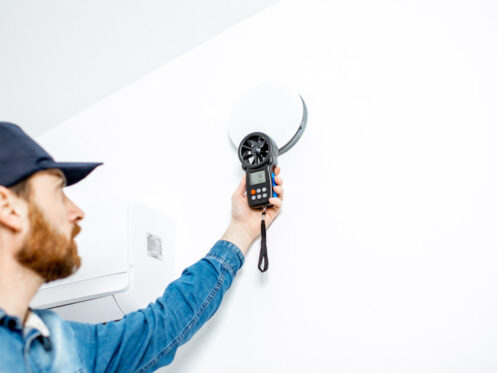Clean air is crucial to health and well-being, particularly for those with respiratory issues and related health conditions. Breathing in smoke, mold, mildew, and other pollutants regularly can be devastating to your quality of life. While you might not be able to do much about the air quality outside your residence, you can take steps to ensure the air you breathe inside is healthy and free of toxins, allergens, and contaminants. A professional indoor air quality (IAQ) evaluation is the first step to remedying any indoor air quality issues. Here’s what you need to know about checking your indoor air quality, why it matters, and how it can improve your quality of life.
What Causes Poor Indoor Air Quality?
Several factors contribute to poor indoor air quality, and you must consider all of them when determining how to best address your particular environment. Pollutants top the list of common culprits when it comes to problems with your indoor air quality, and the variety of pollutants is extensive. Chemicals from paints, cleaning products, off-gassing furniture and carpets, and other items within your home could cause problems for some household residents. Gasses like radon and ozone can also be contributing factors when it comes to air quality problems inside your home.
Another common source of IAQ problems is biological pollution. Bacteria, mold, fungi, and other microorganisms fall into this category. Potentially harmful organisms proliferate due to excessive levels of humidity, leaks, and pools of liquid. Inorganic contributors such as lead, asbestos, and combustion also have the potential to cause serious health hazards. Even something as simple as too much dust can lead to major breathing difficulties.
Your home’s indoor air quality will also be affected by temperature and humidity levels inside your home. Temperatures at either end of the spectrum, too hot or too cold, can affect air circulation. An imbalance in humidity is likely to affect your comfort level while poor indoor ventilation can exacerbate pollutant, temperature, and humidity issues.
Signs of Poor Air Quality
While a meter or other tool might be necessary to identify the type and extent of your IAQ problem, your own eyes and nose can give you plenty of information about the air quality within your home. One visible symptom of air quality problems is water damage on the walls, ceilings, or floors. This can include warping, bowing, discoloration, and flaking. You might smell chemicals, mold, or mildew. Leaking pipes and other hidden water sources could be to blame, but they’ll need to be addressed to fully correct the indoor air quality issues.
Other telltale signs of poor IAQ could be health-related. You should never ignore chronic headaches, coughs, or unexplained congestion that you only experience in your home. Be particularly observant if you live in an older building that may contain asbestos or lead.
Why Have Your Indoor Air Quality Tested?
Having your home’s air quality checked by professionals will determine if you have a problem and give you critical information about the possible source and extent of that problem. Such testing by air quality experts can include collecting data and samples for analysis as well as physical observations. All of these require specific training to be properly interpreted. A professional can gain a full picture from the data, determine the source of the issue, and create a plan to address the situation. Because there are no standardized determinations about what constitutes poor air quality, deciding on your own based on at-home testing kits is usually not a reliable solution unless you possess significant knowledge on the subject. You’ll also need to reach out for assistance if major repairs are necessary.
Benefits of Checking Your Indoor Air Quality
Checking the IAQ in your home offers a host of benefits. Perhaps most importantly, ensuring the IAQ is good protects the health of you and members of your household, including pets. Harmful levels of dust, mold, or chemicals can lead to serious illness, often with long-term effects. You should be especially concerned if you’ve noticed symptoms like persistent eye irritation, dizziness, headaches, burning nose and throat, or fatigue. If you or a family member’s respiratory condition or other medical issue has worsened in recent months, an air quality issue could be to blame. The quality of your air affects your family’s health and safety, but it can also impact your productivity. You aren’t able to think your best if you’re not feeling well.
Determining the existence of an issue and determining its source can save you a lot of trouble and money in the future. For instance, if something like clogged air ducts is to blame, HVAC professionals can clean them. This not only fixes the immediate problem but also lessens the burden placed on your HVAC system, improving its performance and extending its life span. Essentially, such a step could help you save time, money, and frustration. Plus, fixing such problems can also result in savings on your utility bills. When your system isn’t running efficiently, it requires more energy. Taking care of your system is beneficial for your comfort and your wallet. It also helps the environment.
Having your indoor air quality checked could potentially boost your overall comfort. When the source of the problem is identified and addressed, you’re likely to notice more comfortable temperature regulation, less humidity, easier breathing, fewer odors, and more positive results. You should feel comfortable within your residence, and clean air can make a difference in how it feels to spend time there.
Finally, a professional air quality assessment is worth the investment simply for the peace of mind it can bring. When you can identify and take care of what’s causing you and the members of your household discomfort, you’ll know you’ve done your best for the health, safety, and wellbeing of all. You can feel confident that you’ve limited health risks due to poor air quality and that potential risks have been eliminated. Addressing indoor air quality also ensures your home is well taken care of, so you won’t have to worry about additional damage to the foundation, walls, flooring, or even your personal property items. This type of peace of mind can be invaluable.
Indoor Air Quality Improvement and More
Now that you understand the importance of checking the indoor air quality of your home, it’s time to consider your improvement options. Fortunately, you have several strategies for addressing and remedying poor indoor air quality. Our professionals at John Henry's Plumbing, Heating, Air, and Electrical can help in various ways. We can perform duct cleaning, conduct an indoor air quality assessment, and install a UV air sanitizer. Our company also provides a multitude of HVAC services, including heating and air conditioner installation, maintenance, and repair. In addition, we can furnish expert assistance for a full range of plumbing or electrical issues. If you’re located anywhere in Lincoln, NE or the surrounding areas, contact us at John Henry's Plumbing, Heating, Air, and Electrical today to discuss your indoor air quality or other concerns, and we can schedule a consultation.

